Making #WFH and #HBL work for your family: Three dads share their Circuit Breaker strategies
Christine Leow // April 28, 2020, 5:52 pm

CEO of Dads for Life and the Centre for Fathering, Bryan Tan, sharing a work desk with his youngest child, Deborah, during Circuit Breaker. Photo courtesy of Bryan Tan.
Overnight, the Circuit Breaker has turned almost every parent, except those in essential services, into work-from-home (WFH) parents.
It may have been what some had hoped for pre-COVID-19. But the situation now is more challenging. The children are also home, many of them doing home-based learning (HBL) that requires some hand-holding if they are young. Help from extended family or even cleaning ladies is no longer available, given the stay-home directive.
Salt&Light asked three fathers, who have varying experiences with their young families, for their tips on coping with work and family during the Circuit Breaker period.
Dads for life
Bryan Tan is the CEO of Dads for Life and the Centre for Fathering. He has three children – two sons aged 10 and six, and a daughter, four.

The Tans (from left to right): Joshua, Adriana, Deborah, Bryan, Michael. Photo courtesy of Bryan Tan.
His wife Adriana Lim Escaño is the CEO of renowned accessories distributor ABRY Pte Ltd. She is also a founding member of Mums for Life, the counterpart of Dads for Life.
Tan is a Circuit Breaker dad, working from home with his wife during this period while they manage their children.

The Tees enjoying the outdoors before the Circuit Breaker. Photo courtesy of Alex Tee.
Stay-home dad Alex Tee left his banking job after 15 years to home-school his two older children – sons aged eight and seven. His daughter, five, was in a pre-school but is now being home-schooled as well.
Until Tee turned teacher at home, he was the CEO of Bank of America Singapore and the managing director of its trading division.
It has been two years since that decision to walk away from the corporate life. His wife, Channy Kim, left her job this year to join him in home-schooling their children.
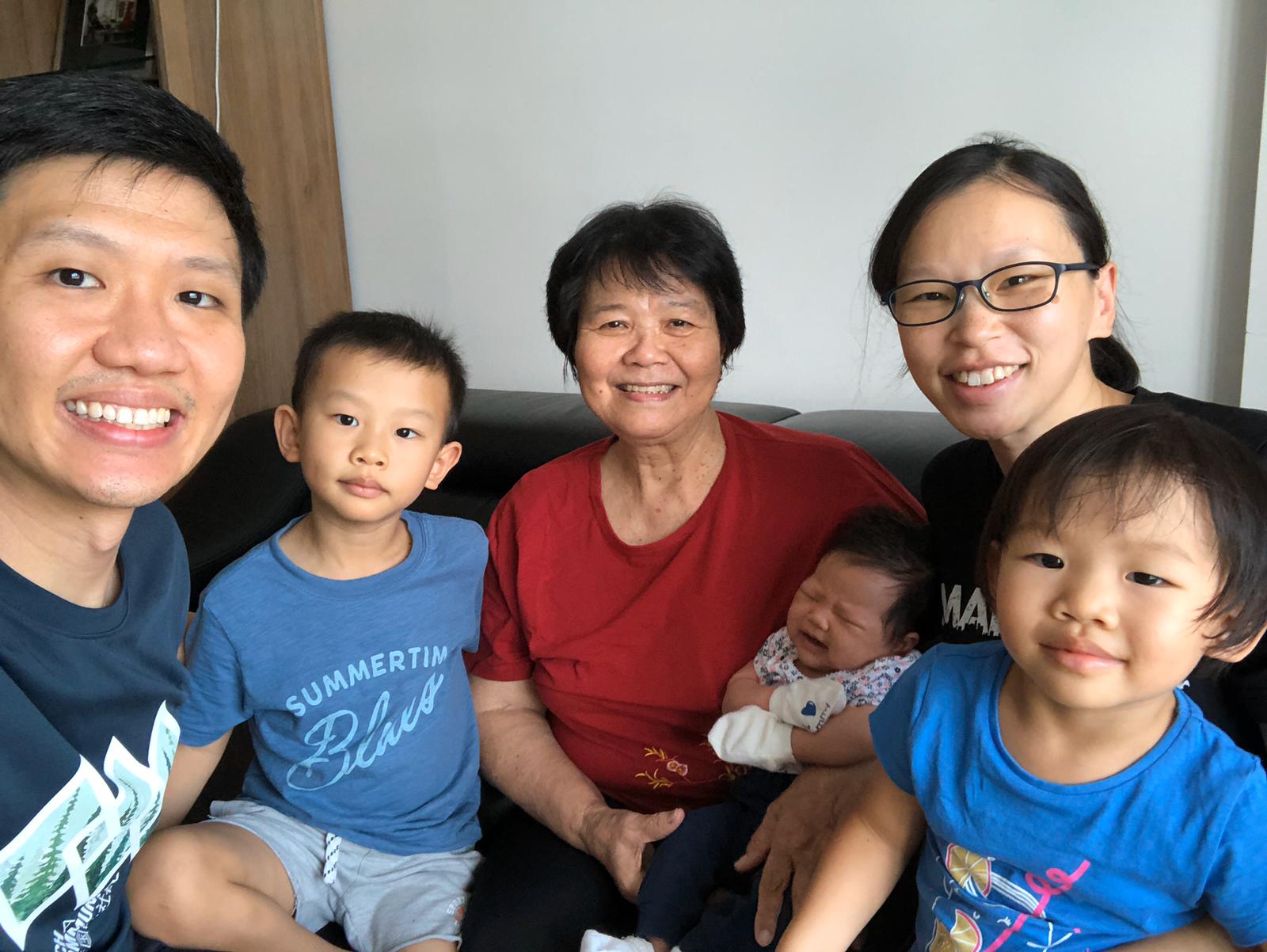
The Ongs: (From left to right) James, Nathanael, their confinement nanny with baby Althea, Siling and Alethea. Photo courtesy of James Ong.
James Ong is father to a son aged five, and two daughters aged two and a half and five weeks. He personally delivered his youngest child at home because the baby came too quickly.
Everything went so well that the medical staff at the hospital asked him to get certified as a mid-wife since he already had the practical experience!
“I told him: It’s okay, one is enough,” Ong laughed.
“Making children a priority is a ‘big yes’ because making disciples is an imperative and joy comes out of it.”
He runs his own training and consultancy company with his wife Siling. Ong has been working out of his home for the last four years.
“At some seasons, the kids really need you, and they really want you. There is a need to recognise the timeliness of this phase,” Ong pointed out.
Top on the fathers’ list when it comes to ensuring work-life balance is making a conscious effort to view family as priority. The choice is deliberate.
Tee added: “Half of the world’s problem is saying ‘yes’ too quickly and not saying ‘no’ quickly enough! The solution to that is having a ‘big yes’.”
For him in this season of his life and his children’s lives, that “big yes” is his family “because making disciples is an imperative and joy comes out of it”.
“We don’t consider the opportunity cost when parents are absent from the lives of their children.”
“What we are trying to do is seek first the kingdom of God and my expression of that is to disciple the kids when they are still young.”
The fathers were quick to admit that such a decision does not come easily. There are financial costs.
For Ong, choosing to work only part-time for a while before setting up his own company meant that finances dropped to a fraction of what it was when he worked full-time.
Household expenditure and holidays had to be scaled back.
“We always think of opportunity cost, how it’s disastrous for our career path. We don’t consider the opportunity cost when parents are absent from the lives of their children,” he reflected.
Circuit Breaker as a gift
So how do these families make the Circuit Breaker work for them? Here are their tips:

The Tee children – Eli, Emin and Ena – having fun with the chickens they rear for eggs. Photo courtesy of Alex Tee.
#1 Recognise that parenting is a partnership
For Tan, whose wife is also working from home during the Circuit Breaker, shared parenting is key.
“We don’t draw lines with chores … We do whatever is needed by the team and work together to accomplish goals.”
“As our oldest child does HBL, one of us will manage home-schooling the younger two or entertaining them, so the other can work,” he said.
This is crucial since the Tans do not have a helper.
Ong added: “Recognising that we are partners with our wives in this journey, learning to be a good team player, is important.”
“We don’t draw lines with chores. In a team setting, there is a larger goal – food to be set out, kids need attention, the house needs to be cleaned. We do whatever is needed by the team and work together to accomplish goals.”
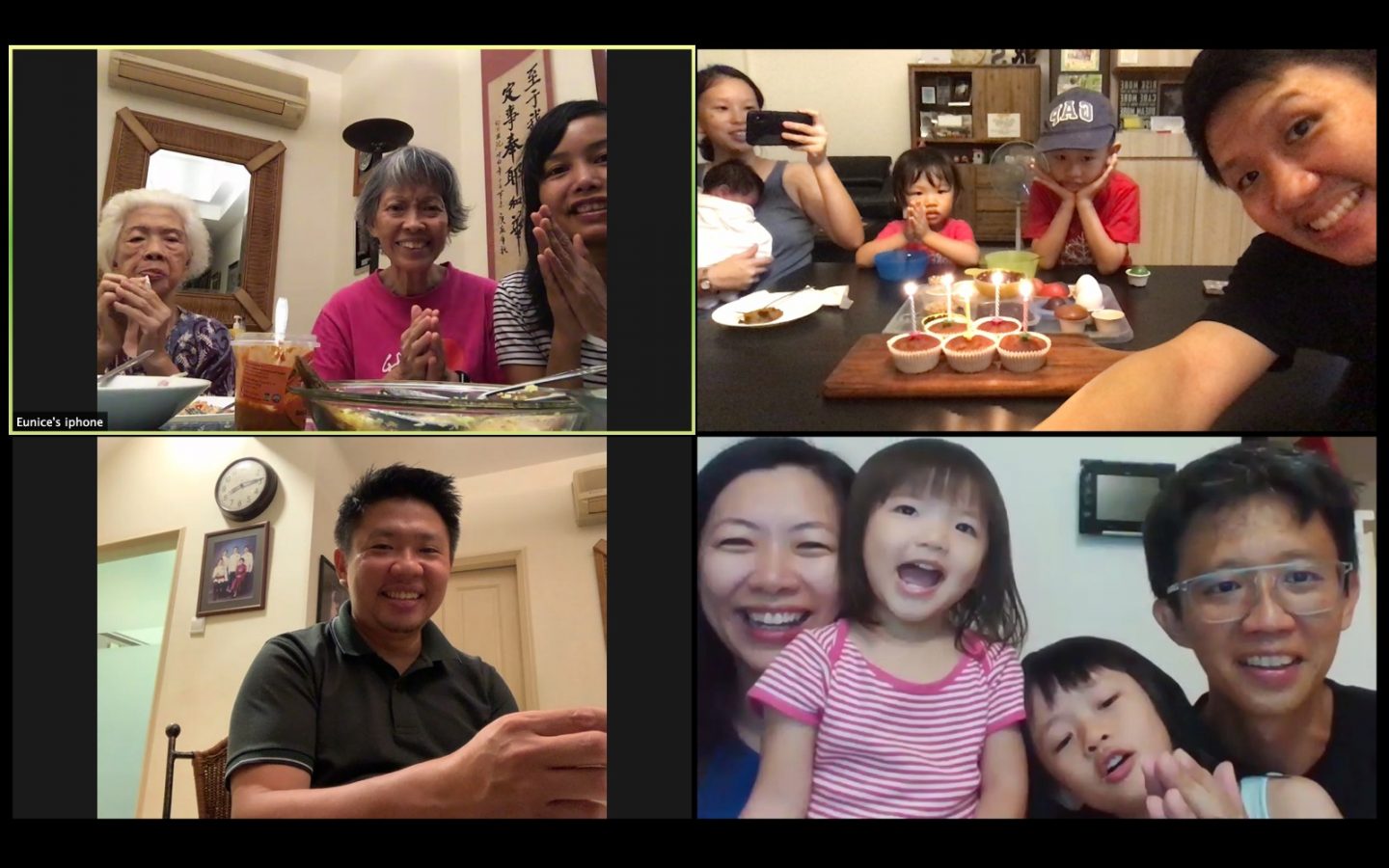
The Ongs (top right) connecting with their extended family via video conferencing. Photo courtesy of James Ong.
The one question Ong asks that helps him remember the importance of partnership is: How can I serve you or the family better?
#2 Make a schedule for the family
The fathers agreed that planning is important during the Circuit Breaker when one day bleeds into the next and the division between work and family life is blurred.
Said Tan: “The concern I had initially was: How do I find time to do my work, find time to support my wife, and also manage the home-based learning and manage kids?”
“I learnt to complete things a lot faster, be more creative. I’m definitely a lot more productive.”
He learnt to draw firm boundaries and to remain focused when working.
“I learnt to complete things a lot faster, be more creative. I’m definitely a lot more productive. If my kid comes along while I am at work, I acknowledge his presence. If I can, I pay him some attention so he doesn’t feel like work is more important.
“If I’m rushing, I let him know and it becomes a conversation later on about interrupting and honouring the time.”
Tee, who has been home-schooling his oldest two children, is used to making schedules for the family.
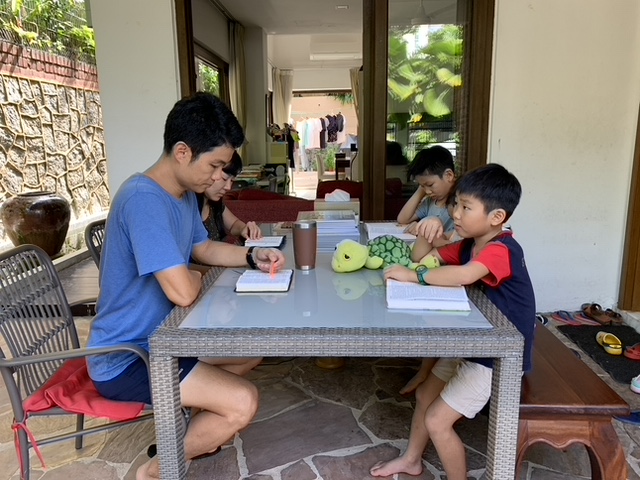
As Tee home-schools his children, schedules are especially important for giving home life form and structure. Photo courtesy of Alex Tee.
“School is between nine and noon, and then again for an hour in the afternoon. So, if I’m asked to do something during the weekday morning, my automatic answer is ‘no’,” he said.
With children, the best-laid plans may not always work. Ong has a solution: “Be open to daily adjustments. Talk about it, debrief, and then make it better.”
#3 Be patient with yourself and others
These are unprecedented times and the margin for error can be wide. Being patient with yourself, your spouse and your children helps.

Ong siblings Nathanael and Alethea keep occupied with craftwork. Photo courtesy of James Ong.
“We sometimes relate to kids as if they are adults, expecting them to respond immediately or following instructions to a tee. Then we get frustrated when they can’t do it,” said Ong.
“We need to tailor expectation and instructions to their age and competency.”
#4 Have everyone participate
Another strategy the fathers use: Include the children in making WFH work.

The Tan children entertain each other so Tan and his wife can work in the afternoons. Photo courtesy of Bryan Tan.
“In the afternoon, when the oldest no longer has HBL, he’s in charge of entertaining the other two. Then, my wife and I can both focus on what we need to do for work,” said Tan.
Ong also believes in getting the children to chip in.
“We need to give our kids the perspective that they are important, but the world does not revolve around them. They are a member of the larger family and what else goes on in the family,” he said.
“Use this time to work on habits in your children.”
Tee’s children play with each other, freeing him and his wife to attend to the other matters.
“These past few days, they have been completely absorbed in making clothes for their soft toys and figurines! They used scraps of cloth and a very large piece of wrapping paper that came with the home-schooling material that had arrived.”
Fights do break out but Tee takes it in his stride and uses them as teachable moments to form habits of self-control, kindness and obedience.
The stay-home dad agrees that much of this has only been possible because he is home with the children all the time.
“But now, everyone is home. Use this time to work on habits in your children,” he encouraged.
#5 When things fall apart, persevere
Press on even when there are setbacks and kinks in the plan.
Tan credits his wife for the family’s ability to make the Circuit Breaker period work for them, even with three young children at home.
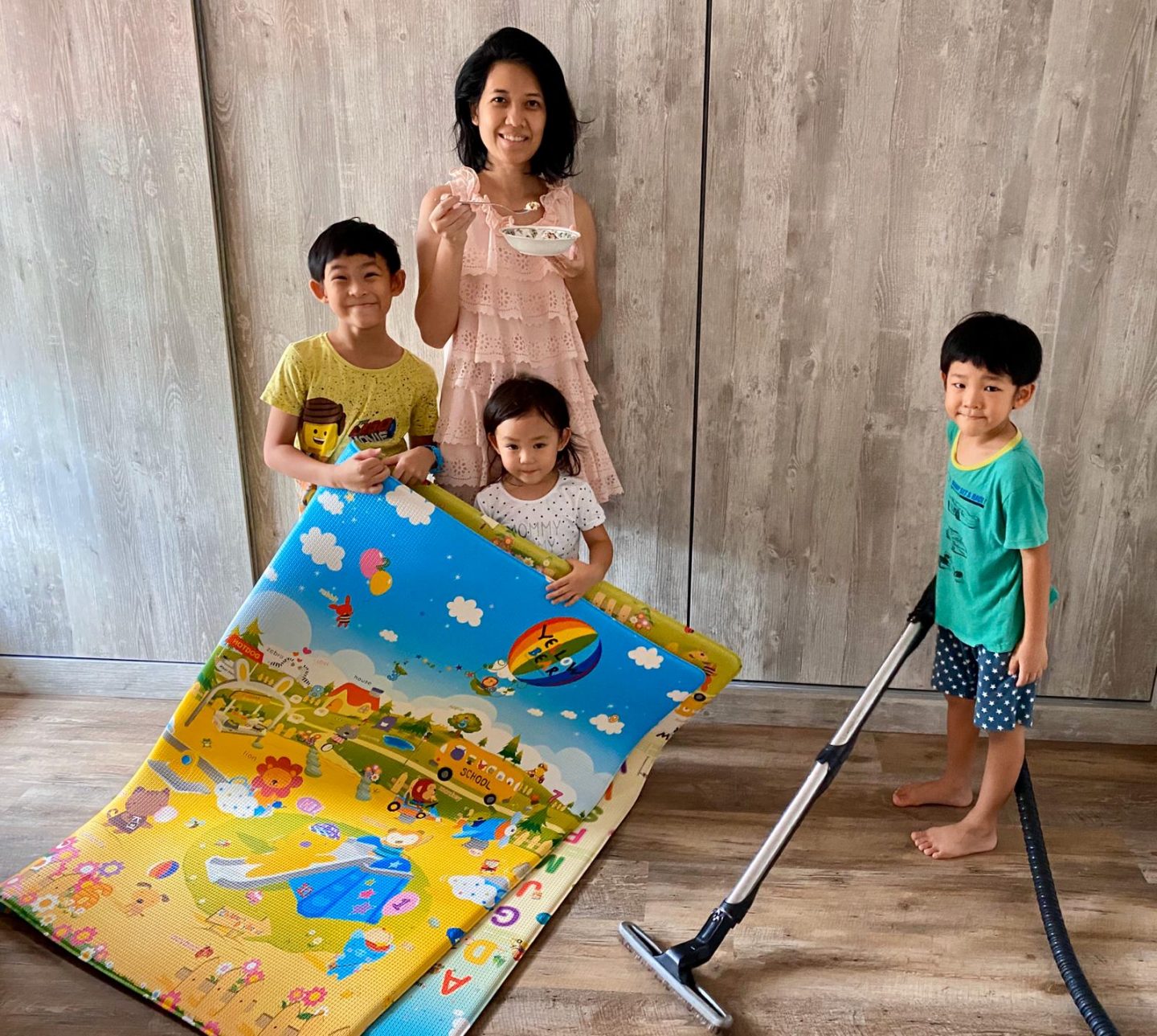
Tan credits his wife Adriana for keeping the channels of communication open. Photo courtesy of Bryan Tan.
“My wife talks a lot to me. I’m an introvert. It’s hard to get anything out of me but she perseveres and she gets me to talk about how we want to be parenting and supporting each other,” said Tan.
Her efforts inspire him to persevere.
#6 Have a long-term perspective on challenges
Some of the frustrations during this stay-home period may arise from the many uncertainties.
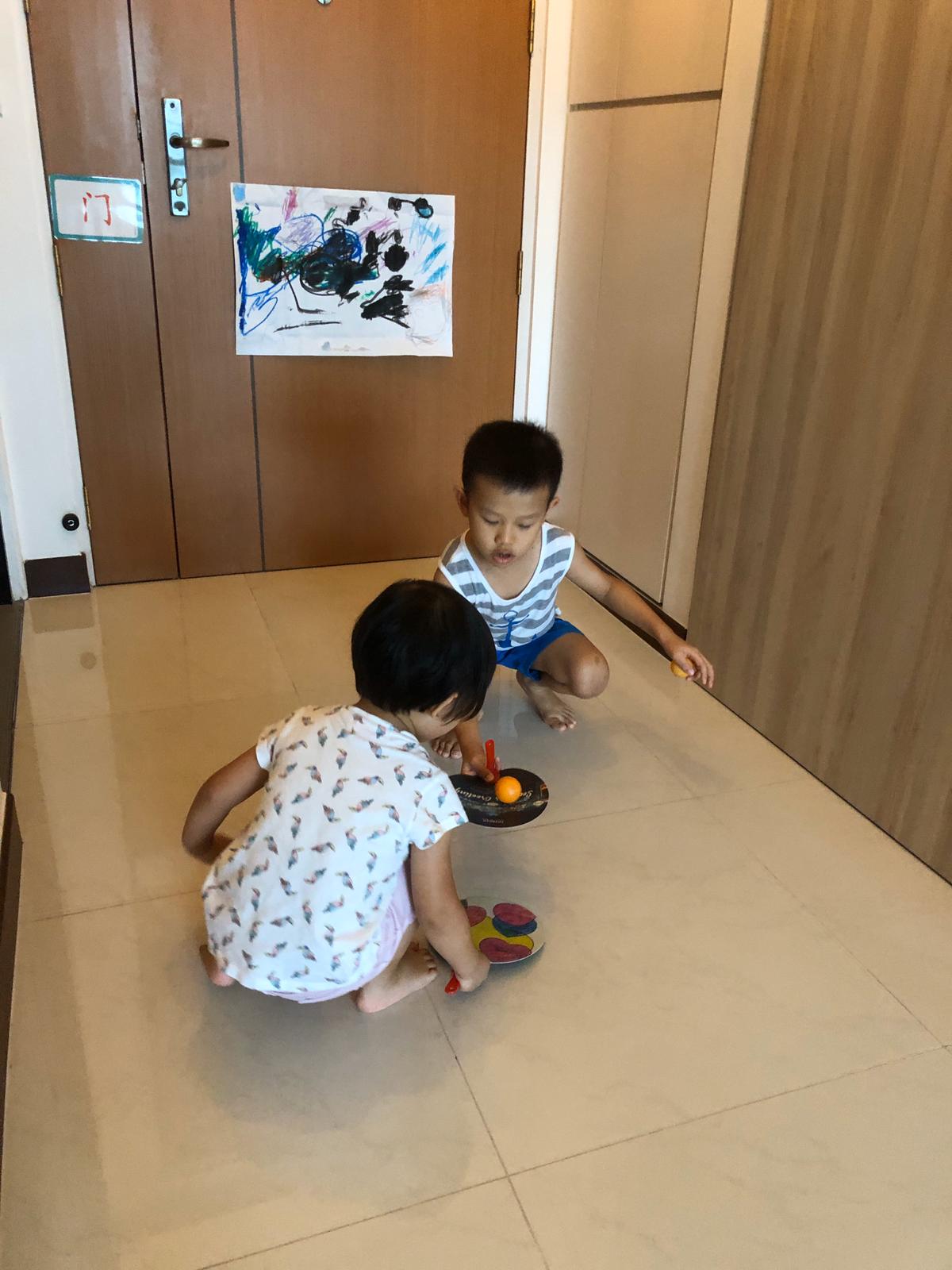
Ong sees this season at home with his children as a time for personal transformation as well. Photo courtesy of James Ong.
Ong, whose training and consultancy work has been put on pause, believes that a proper perspective helps. While a changed perspective may not be an active strategy, perspectives can inform action, he said.
“One way we reframe difficult situations is to look upon them as opportunities to form in us a trait that pleases God.”
“I see it as a chance for transformation to take place in families, economies and individual lives,” he said.
“We can use this time to re-prioritise, re-skill. Then when we move forward, we are in a better position to face new challenges.”
Tee agreed: “One way we reframe a difficult situation is to look upon them as opportunities to form in us a trait that pleases God.”
For working dad Tan, being home all the time now has made him more aware of the chaos a house with young children can have.
“I used to want things to be orderly – keep one set of toys before you take out another. It added tension to my relationship with my kids. My wife felt pressured.
“I had to calibrate my own expectations and place relationship over my own need to be neat.”
“I am a COVID-19 survivor”: Grace AOG Senior Pastor discharged after 10 days
Banking head honcho now works with villagers and ex-convicts
We are an independent, non-profit organisation that relies on the generosity of our readers, such as yourself, to continue serving the kingdom. Every dollar donated goes directly back into our editorial coverage.
Would you consider partnering with us in our kingdom work by supporting us financially, either as a one-off donation, or a recurring pledge?
Support Salt&Light



